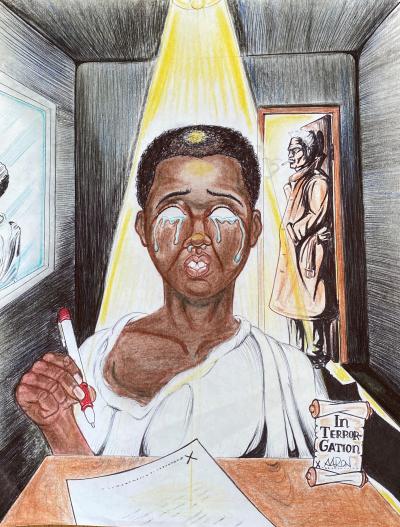
On April 21, 2025, the Philosophy for Humans learning community had the pleasure of hosting a distinguished guest speaker, Dr. Jennifer Lackey, Professor of Philosophy at Northwestern University. We discussed her controversial book, Criminal Testimonial Injustice, which highlights the ways in which epistemic agency – an individual’s responsiveness to reasons or evidence – may be circumvented, abused, or undermined within the criminal justice system.
After reading and examining Dr. Lackey’s research on the multiple accounts of incredulous eyewitness testimonies and false confessions that too frequently occur within the criminal interrogation process, our learning community was more than eager to meet her. We hoped that our discussion would provide a deeper understanding of the power of epistemic agency and its very real social consequences.
Initially, we approached Dr. Lackey with some skepticism, possibly due to the fact that half of our learning community is made up of incarcerated men with lived experience with the interrogation process and who are apprehensive of “experts.” Lackey was met with a barrage of questions concerning her background, credentials, and personal opinions about issues like criminal justice reform and prison abolition. In response, she asserted her position as an epistemologist and explained that her purpose in writing the book was to raise awareness of the ongoing systemic testimonial injustice through storytelling. During our conversation, Dr. Lackey also expounded on her extensive research into the numerous erroneously handled cases detailed in her book. She examined how investigators used tactics of manipulation, deception, and coercion that circumvented the witness’s rational capacity in order to extract testimonies and secure convictions. Dr. Lackey expressed that the danger here lies within the unwarranted excess of credibility given to the extraction without proper due diligence
This danger is presented clearly in the case of the Dixmoor Five, where a14-year-old girl was found raped and murdered near her home in Dixmoor, Illinois in 1991. In response, five juveniles were arrested and interrogated. Two of the youths pled guilty and testified against the other defendants in exchange for shorter sentences. In 2011, the Dixmoor Five petitioned the courts to have DNA evidence from the crime scene retested. The new DNA test supported their innocence and positively identified a man with a prior rape conviction as the perpetrator of the crime. The Dixmoor Five motioned to have their convictions vacated, yet the state of Illinois argued that the two men, who admitted guilt as children under duress, were barred from post-conviction relief due to their initial pleas. I imagine the terror that ensues in such an instance would first be the pretense of justice that deceives the public with a fraudulent sense of security. Second is the reality that a treacherous predator remained at large without pursuit. Lastly comes the realization that innocent children were falsely imprisoned for two decades. This miscarriage of justice is perpetrated by the state in the name of closing cases, whether those charged were guilty or not.
The disturbing truth weighed heavy on the minds of our learning community members, and we began to ideate with Dr. Lackey on potential remedies and reforms to address these deficiencies within our criminal justice system. After careful consideration, we ultimately agreed that community organizing, networking, and storytelling are highly effective strategies for empowerment against the epistemic wrongs that corrode the course of justice. Undoubtably, the social harm caused by testimonial injustice are many, and they must be addressed if we are to create a better world for the generations to come.
Dr. Lackey’s sharp assessment of testimonial injustice was quite informative and compelling. I especially enjoyed the visit because she and I are both natives of Chicago and she very much reminded me of home. After our meeting, I was inspired to create an illustration, entitled “In Terror Gation.” The work depicts an African American youth who has been interrogated and is faced with the dilemma of signing a document whose content and consequences are beyond his mental faculty.
P4H would like to thank Dr. Jennifer Lackey for coming inside and sharing her expertise as well as her lived experience with us on the Hill. The exchange was exhilarating, and her book Criminal Testimonial Injustice should be considered essential to the fight for justice and equality in society today
